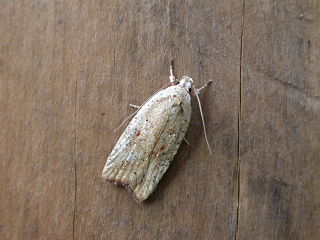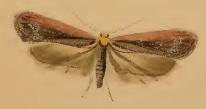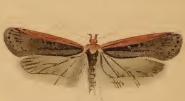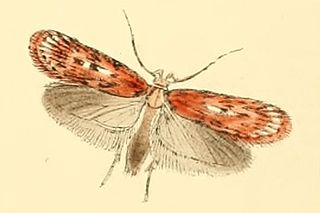
The gorse tip moth is a smallish moth species of the family Depressariidae.

Depressaria is a genus of moths in the superfamily Gelechioidea. It is the type genus of subfamily Depressariinae, which is often – particularly in older treatments – considered a distinct family Depressariidae or included in the Elachistidae, but actually seems to belong in the Oecophoridae.

Blunt’s flat-body or purple carrot-seed moth is a moth of the family Depressariidae. It is found in most of Europe. It is also found in the Near East, North Africa, the eastern part of the Palearctic realm and since 2009 in North America. In the former USSR, it is distributed in the entire European part except for the Far North. It is also found in the northern Caucasus and Transcaucasia, in Kazakhstan, Central Asia, the south of Siberia, and the Russian Far East. It is an introduced species in North America, where it has been reported from Québec and Ontario.

Depressaria emeritella is a moth of the family Depressariidae. It is found in most of Europe. It is also found in the Near East and the eastern part of the Palearctic realm.
Coleophora halophilella is a moth of the family Coleophoridae. It is found in France, Italy, Austria, the Czech Republic, Slovakia, Hungary, Croatia, Romania, Poland, Ukraine, Greece, Crete and southern Russia.

Depressaria albipunctella is a moth of the family Depressariidae. It is found in most of Europe, as well as in Libya.

Depressaria chaerophylli is a moth of the family Depressariidae.

Depressaria libanotidella is a moth of the family Depressariidae. It is found in most of Europe, except Great Britain, Ireland, the Benelux, Portugal, Norway, Poland, most of the Balkan Peninsula and most of the Baltic region.

Depressaria pimpinellae is a moth of the family Depressariidae. It is found in most of Europe, except Ireland, Portugal and most of the Balkan Peninsula.

Depressaria daucella is a moth of the family Depressariidae. It is found in most of Europe, except most of the Balkan Peninsula. It is also found in North America.

Depressaria artemisiae is a moth of the family Depressariidae. It is found in most of Europe, except Ireland, Great Britain, the Netherlands, Belgium, the Iberian Peninsula and most of the Balkan Peninsula. It is also found in North America.

Depressaria badiella is a moth of the family Depressariidae. It is found in most of Europe, Libya, the Caucasus and Mongolia.
Depressaria cervicella is a moth of the family Depressariidae. It is found in Spain, Italy, Austria, the Czech Republic, Hungary and Croatia. It is also found in Asia Minor and Iran.
Depressaria discipunctella is a moth of the family Depressariidae. It is found in the Netherlands, Belgium, Germany, France, Spain, Portugal, Italy, Slovakia, Ukraine, Romania, Bulgaria, North Macedonia and Greece. Outside Europe it has been recorded from Lebanon, Syria and Iran. Formally found in Great Britain, where it was previously widespread.
Depressaria douglasella is a moth of the family Depressariidae. It is found in most of Europe.

Depressaria dictamnella is a moth of the family Depressariidae. It is found in Germany, Austria, Italy, Hungary, Croatia, North Macedonia, Bulgaria, Romania, Moldova and Ukraine.

Depressaria pulcherrimella is a moth of the family Depressariidae. It is found in most of Europe, except the Balkan Peninsula.

Depressaria sordidatella is a moth of the family Depressariidae. It is found in most of Europe, except Ireland, Portugal, Belgium, Ukraine and most of the Balkan Peninsula.

The parsnip moth or parsnip webworm is a moth of the family Depressariidae. It is found in most of Europe, except Portugal and most of the Balkan Peninsula. This species has also been introduced into New Zealand.








